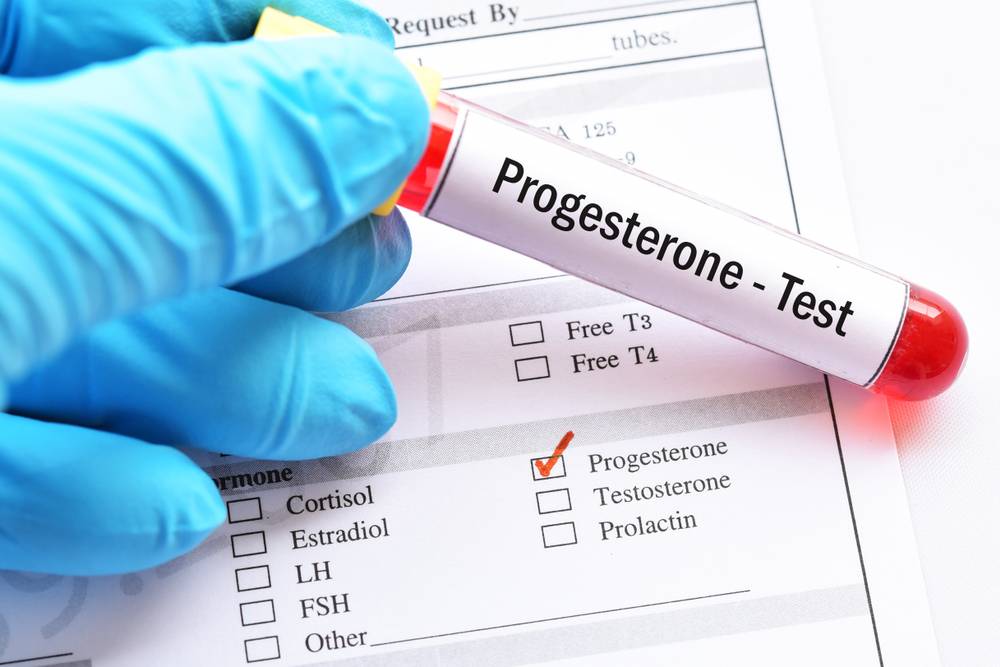Is there a bigger bummer than not getting pregnant? Yes, there is: finally getting pregnant and losing it to low progesterone.
Sure enough, in order to get and maintain a pregnancy, all pieces should fall in place, like in a giant puzzle. It is all about timing, normal hormone levels and perfectly well functioning body parts.
Some of these elements, if out of whack, may be difficult to address. Blocked tubes may mean natural conception is not in the cards, and you’re being pointed towards IVF. Same for male fertility when numbers are really bad, plain intercourse or IUI may be a waste of time and you may need IVF. And that means time, and money, quite lots of it, depending on where you live and what your medical coverage is.
Yet there is this little hormone of huge importance in conception. We can’t do without it. We hate it for the way it mimics pregnancy symptoms and misleads us into believing this might be the month. But when this little guy keeps a low profile, there is either no conception or even worse, early miscarriage may occur, sometimes recurrently.
Check out this video for Signs of low progesterone
So, what is Progesterone?
It is the most important progestogen in the body. A sex hormone involved in the menstrual cycle and pregnancy.
It is actually called the “hormone of pregnancy” because it is under its influence the endometrium is being converted to its secretory stage, in order to prepare the uterus for implantation, should fertilization occur.
When pregnancy doesn’t occur, progesterone levels drop and this brings on the menstruation. If ovulation doesn’t happen and there is no Corpus Luteum developing, progesterone levels are low and we will get an anovulatory cycle with dysfunctional uterine bleeding.
But sometimes, in healthy fertile women, ovulation does happen, a Corpus Luteum is formed yet the progesterone level fails to rise. The eggs may get fertilized, but with the Corpus Luteum producing low progesterone the endometrium doesn’t develop properly.
The embryo either doesn’t attach to the uterine lining at all, or it does, but poorly. In any case, with progesterone under the desired levels, the endometrium is not capable of nourishing the new pregnancy and it starts shedding. Sometimes this happens even before we get the chance to find out we are pregnant.
Before the early detection home pregnancy tests, many women experienced missed miscarriages or chemical pregnancies they were not even aware of. They would usually notice either a little period delay or a heavier flow, and never give it another thought. The history kept repeating itself. No known cause, no solution.
Nowadays, with women being very much in tune with their bodies and planning for pregnancy more often than not, progesterone testing at 7 days post ovulation, when this hormone’s levels are supposed to peak, has become pretty much a standard test.
The idea is any level over 5 ng/ml means ovulation, although a level of 5 is considered low and needs supplementation. In natural cycles, doctors would want your results to be over 10 ng/ml, whereas in clomiphene cycles the level is usually higher then 15 ng/ml.
The luteal phase deficiency
What happens when our progesterone levels persist in being low post ovulation? This leads to the endometrial lining being unprepared for pregnancy, which eventually leads to early shedding.
The period of time comprised between Ovulation and the first day of the next period is called Luteal Phase. Its normal length in a healthy woman is of 12 to 16 days.
When the Luteal Phase is shorter than 10 days, we call it a Luteal Phase Deficiency, the usual symptoms being:
· menstruation arrives earlier than it is supposed too
· there is brown spotting starting a few days before the expected period date
· there is spotting or light bleeding in between periods
· pregnancy doesn’t occur although all other tests seem to be normal
· early miscarriages keep occurring
The good news is a Luteal Phase defect is very easily detectable and all it takes is a blood test taken around day 7 post ovulation. Yes, progesterone levels keep fluctuating during the day, but if your levels are consistently low, chances are you may have a problem with progesterone production.
The even better news is Luteal Phase defect is very easy to be addressed, and with the appropriate progesterone supplementation your levels may get back to normal very rapidly.
The decision to supplement should be taken together with your doctor, because in order to have this supplements really work and do their job you will need prescription progesterone, administered either orally (some side effects), vaginally (less side effects) or rectally.
There are over the counter progesterone creams all over the web, and the so-called natural progesterone creams, but while they probably won’t hurt you, they surely won’t do you much good if indeed your problem is a Luteal Phase defect.
The issue with these creams is it is very complicated if not impossible to dose them properly. You practically have no control over the quantity to be used, which in most of the cases is not substantial enough to make a difference.
Another important point is progesterone supplementation is usually best to be started 2-3 days post ovulation in order to really work.
Never earlier, because a rise in Progesterone levels before Ovulation may prevent ovulation from happening, and not later because it simply may be too late. You want your lining to be in good shape in case you conceive, rather than trying to save the day once pregnancy is confirmed.
Treating the luteal phase deficiency is important, especially when we are trying to have a baby.
But it is equally important to know that the Luteal phase defect can also be caused by health conditions. And in this case, further assessment is necessary, because you would want to address the cause and not only treat the effect.
What can cause Luteal phase deficiency?
· Endometriosis
· Polycystic ovaries (PCOS)
· Thyroid disorders
· Obesity
· Pre-menopause
· Anorexia
Or, a defect of the Luteal phase may be just an occurrence in the life of an otherwise healthy female, something that may happen on and off throughout her reproductive years.
It is a venue worth exploring, if you have trouble conceiving or if you encounter any of the symptoms mentioned above. A simple blood test may save you time and heartache and although early miscarriage may have many other causes, from chromosomal abnormalities to clotting and auto-immune issues, low progesterone is nevertheless one of them. One that is easy to detect and prevent.
And while progesterone supplementation cannot save what we call “a bad” pregnancy, it can surely save a good one, if Luteal Deficiency is what is keeping it from sticking.
Sources
E, M. (2019). Endometriosis and luteal phase defect. – PubMed – NCBI. [online] Ncbi.nlm.nih.gov. Available at: https://www.ncbi.nlm.nih.gov/pubmed/8379865 [Accessed 5 Dec. 2019].
Brazilian Journal of Medical and Biological Research (2004) 37: 1637-1644 , Hyperinsulinemia and luteal phase progesterone deficiency
Schliep, K.C. et al., 2014. Luteal phase deficiency in regularly menstruating women: prevalence and overlap in identification based on clinical and biochemical diagnostic criteria. The Journal of clinical endocrinology and metabolism. Available at: https://www.ncbi.nlm.nih.gov/pmc/articles/PMC4037737/ [Accessed December 5, 2019].



